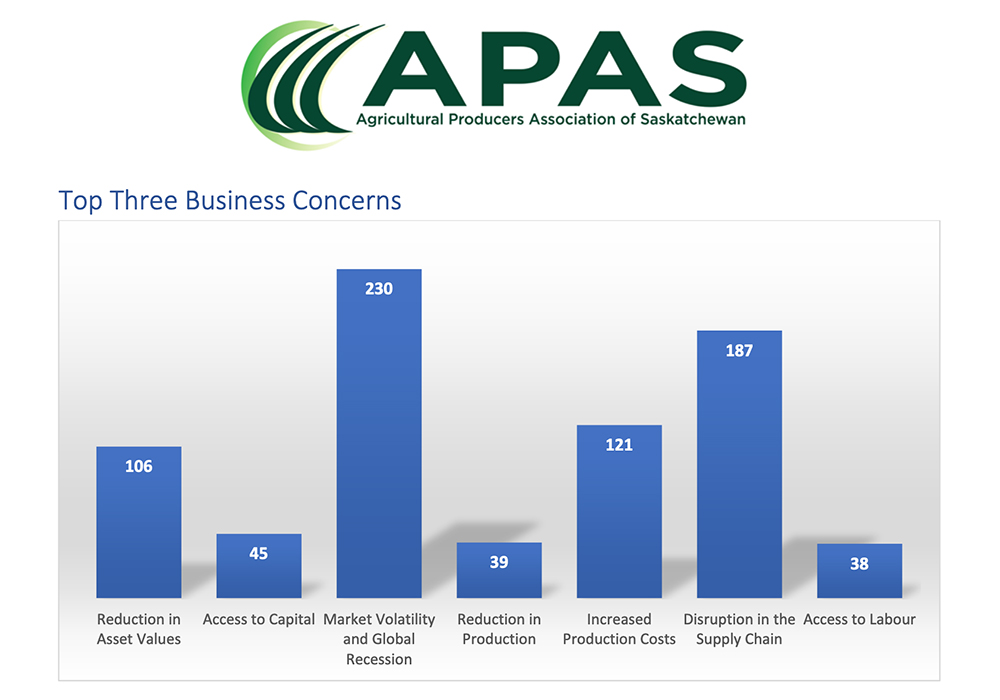An online survey conducted by the Agricultural Producers Association of Saskatchewan suggests that the COVID-19 pandemic is already having a financial impact on producers.
The survey also found that the top four COVID-related business concerns among Saskatchewan farmers are market volatility, disruptions in the supply chain, increased production costs and a reduction in asset values.
“We’re hearing from farmers that their access to farm inputs like fuel, fertilizer, veterinary services and seed are already being disrupted,” said APAS president Todd Lewis, a grain and oilseed producer from Gray, Sask.
Read Also

Canadian Food Inspection Agency extends chronic wasting disease control program consultation deadline
Date extended for consultation period of changes to CWD program
“Nearly half of those that responded to the survey also indicated that they’re experiencing delays with being able to sell or deliver what they produce on the farm. It’s early days, but these are things we need to keep a close eye on.”
The APAS survey was launched late last month. It can be completed online at apas.ca/survey, and will be updated regularly with new questions.
In a recent news release, APAS said the survey will track how the province’s agricultural sector is coping with the rapidly evolving COVID-19 crisis.
“The situation is changing fast, and it’s crucial for us to have real-time information to share with government about how farmers are being affected…,” Lewis said.
“The more data APAS can collect about what’s happening at the Saskatchewan farmgate, the more likely it will be for government support measures to actually meet farmers’ needs.”
Last month, the federal government increased the lending capacity of Farm Credit Canada by $5 billion and extended repayment deadlines on outstanding Advance Payments Program loans.
Farmer response to those initiatives has been lukewarm.
APAS and other farm groups initially welcomed the moves, calling them a good first step. Since then, farmers across the West have been calling for additional measures.
Calls in late March for a suspension of the federal carbon tax on non-exempt farm fuels were ignored by Ottawa.
“So far, the government’s COVID-19 support to farmers has been to increase our access to loans, but going into even more debt isn’t the answer,” APAS said.
“Just look south of the border, where agriculture has received huge subsidies for years. Canadian farmers can’t compete with that, especially not during a global crisis like this. If agriculture is essential for the Canadian economy, it’s time for governments to directly invest in our farmers.”
The Western Canadian Wheat Growers Association has been critical of Ottawa’s carbon tax, which increased by 50 percent on April 1 to $30 per tonne of carbon dioxide equivalent.
In backstop jurisdictions, the tax will be applied to the consumption of non-exempt farm fuels such as propane and natural gas. It will also be applied to all diesel fuel used by the commercial trucking industry.
“The Canadian economy is facing a serious challenge,” said outgoing WCWGA president Gunter Jochum.
“Adding a 50 percent increase in the carbon tax is a further hit to grain farmers’ bottom line and Canadian consumers’ food bills. Now is not the time to be to be adding to our household expenses.”
“Rather than increasing the costs for consumers, the government should be doing everything necessary to ensure our transportation system stays operational,” added Daryl Fransoo, the organization’s new president.
“From our trucking system to rail and ports, we need to keep our grain moving both domestically and for export.”
Officials at APAS said their organization is paying particular attention to the number of farmers who anticipate — or are already experiencing — financial hardship as a result of the COVID-19 pandemic.
Farmers who sell locally grown meat and produce to the restaurant industry have been hit particularly hard. Direct farm sales to the restaurant industry have slowed to a trickle or ceased completely in many parts of the country.
Out of the 262 farmers who responded to the APAS survey between March 25 and April 5, more than 70 percent said they expected the crisis to result in reduced commodity prices, lower revenue and reduced cash flow.
Another 53 percent said cash flow was an immediate financial concern.
“Farmers need cash to be able to get their crop in the ground this spring, and after the brutal last couple of years we’ve dealt with, reduced cash flow could really break people,” Lewis said.
Additional data is needed to ensure that the challenges and needs of the industry are well understood.
“We’ve updated the survey with new questions and will continue to do so weekly. We know that the situation is going to change significantly over time, so we’re asking farmers to complete the survey every week.”
The latest survey asks farmers to share information about unharvested acres from the 2019 growing season, disruptions or problems with rural internet and cell services, and difficulties dealing with meat processing facilities.
















